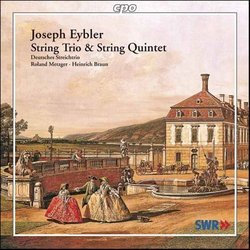| All Artists: Joseph Leopold Eybler, Deutsches Streichtrio Title: String Trio & String Quintet Members Wishing: 0 Total Copies: 0 Label: Cpo Records Original Release Date: 1/1/2006 Re-Release Date: 4/18/2006 Genre: Classical Styles: Chamber Music, Historical Periods, Classical (c.1770-1830) Number of Discs: 1 SwapaCD Credits: 1 UPC: 761203702527 |
Search - Joseph Leopold Eybler, Deutsches Streichtrio :: String Trio & String Quintet
 | Joseph Leopold Eybler, Deutsches Streichtrio String Trio & String Quintet Genre: Classical |
Larger Image |
CD Details |
CD ReviewsEybler's Chamber Music -- A Real Discovery J Scott Morrison | Middlebury VT, USA | 05/04/2006 (5 out of 5 stars) "Joseph Eybler (1765-1846) turns the usual story about the life and struggles of the young musician on its head. He had studied under Albrechtsberger, been befriended by Haydn and Mozart, but he chose to go to law school rather than pursue music as a career. When his parents' home was destroyed in a fire, he needed to make some money to help out and that's when he went to work as a musician. He never returned to law school. In his day he was a celebrated composer, considered by some to be the logical heir to Mozart and Haydn. Indeed, Constanze Weber Mozart asked him to complete her husband's unfinished Requiem after Mozart's death. He made a start on that task but was overwhelmed with the responsibility and gave it up (although some of what he had done was used by Sussmayer in his subsequent completion of the work). Ironically, many years later he suffered a stroke while conducting a performance of the Requiem, thus ending his own productive career as court composer, successor to Salieri.
Each of the two works contained here are worthy of our closest consideration. The String Trio, Op. 2, is unusual in that the viola part is extremely virtuosic, like that of Mozart's Divertimento, K. 563. And although it doesn't rise to that work's heights, it is an extremely interesting and engaging work. It is in five movements, with a large first movement which is an Allegro bracketed by two Adagio recitative-like passages. The most interesting movement from the point of view of form is the Minuet: it has three trios, each featuring a different instrument in a concertante role. The final Rondo is based on a folk-like dance tune and ends the work with a flourish. The String Quintet is even more unusual: it is for the very rare combination of violin, two violas, cello and contrabass. The viola parts are even more virtuosic than that of the Trio. One characteristic of Eybler's music is his emphasis on lower string parts. All the chamber works feature extensive cantilenas and tricky counterpoint for viola, cello and, in this case, bass. This gives his works, particularly the five quintets, a recognizable 'Eybler sound.' The overall effect of this quintet is more that of a divertimento (and its six movements, rather than four, emphasizes that characteristic) than of a quintet such as those of Mozart or Schubert. The style sounds like an amalgam of Haydn and Mozart. He has a knack for inventing memorable melodies, has a penchant for slightly unexpected harmonic ventures, and a quirky but satisfying sense of form. I wish he had written more chamber works, but after his appointment first as Salieri's deputy and then his successor as court music director, he turned his attentions to sacred music. Our loss. The Deutsches Streichtrio (German String Trio) are superb chamber musicians. They are Hans Kalafusz, violin (familiar from his role as concertmaster of the Stuttgart Radio Symphony), Juergen Weber, viola, and Reiner Ginzel, cello. They are joined in the Quintet by Roland Metzger, second viola, and Heinrich Braun, double bass. I'd not heard this group before but am very impressed with their musicianship. The recorded sound is excellent. I thoroughly enjoyed this CD and would recommend it to anyone who loves chamber music of the late 18th and early 19th centuries. I will be looking for more such issues from this group of fine musicians. Scott Morrison" |
